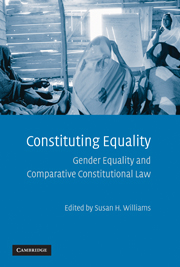Book contents
- Frontmatter
- Contents
- List of Contributors
- Acknowledgments
- CONSTITUTING EQUALITY
- Introduction: Comparative Constitutional Law, Gender Equality, and Constitutional Design
- SECTION ONE STRUCTURE
- SECTION TWO RIGHTS
- SECTION THREE CULTURE/RELIGION AND GENDER EQUALITY
- SECTION FOUR CONSTITUTIONS AND INTERNATIONAL LAW
- 10 Constitutional Incorporation of International and Comparative Human Rights Law: The Colombian Constitutional Court Decision C-355/2006
- 11 Guatemalan Transnational Feminists: How Their Search for Constitutional Equality Interplays with International Law
- SECTION FIVE WOMEN IN THE PROCESS OF CONSTITUTION MAKING
- Conclusion: Gender Equality and the Idea of a Constitution: Entrenchment, Jurisdiction, and Interpretation
- Index
- References
11 - Guatemalan Transnational Feminists: How Their Search for Constitutional Equality Interplays with International Law
Published online by Cambridge University Press: 26 October 2009
- Frontmatter
- Contents
- List of Contributors
- Acknowledgments
- CONSTITUTING EQUALITY
- Introduction: Comparative Constitutional Law, Gender Equality, and Constitutional Design
- SECTION ONE STRUCTURE
- SECTION TWO RIGHTS
- SECTION THREE CULTURE/RELIGION AND GENDER EQUALITY
- SECTION FOUR CONSTITUTIONS AND INTERNATIONAL LAW
- 10 Constitutional Incorporation of International and Comparative Human Rights Law: The Colombian Constitutional Court Decision C-355/2006
- 11 Guatemalan Transnational Feminists: How Their Search for Constitutional Equality Interplays with International Law
- SECTION FIVE WOMEN IN THE PROCESS OF CONSTITUTION MAKING
- Conclusion: Gender Equality and the Idea of a Constitution: Entrenchment, Jurisdiction, and Interpretation
- Index
- References
Summary
INTRODUCTION
This chapter addresses the relationship between international law and Guatemalan women who have advocated for constitutional and legal reform on matters of gender equality. The aims are two-fold and both require attention to the complexly interwoven relationship between individuals' rights, constitutional law, and international law. The first aim is to provide an example of how transnational feminists, active in both the transnational sphere and in the domestic field, can have a profound influence on constitutional meaning, often as a result of strategic engagement with international law and institutions. The second aim is to highlight the role constitutions play, together with other relevant documents and actions, as sources in the making of customary international law (CIL). This is a case study of women's efforts to attain gender equality in Guatemala through engagement with the legal system. It illustrates the relevance of individuals in shaping domestic law and altering the content of CIL through active use of the legal system, including constitutional challenges, sometimes buttressed by international norms, treaties, and institutions. In particular, this example highlights the core concern that designating states as the sole “subjects” under international law, such that they are the only entities whose participation is legitimized in the CIL formation process, is not sound given the inherent skepticism within international legal doctrine regarding state adherence to human rights law, especially in states known for violations, such as Guatemala.
- Type
- Chapter
- Information
- Constituting EqualityGender Equality and Comparative Constitutional Law, pp. 248 - 270Publisher: Cambridge University PressPrint publication year: 2009



